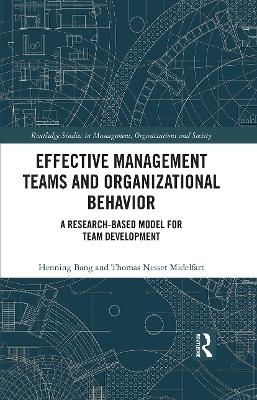
Effective Management Teams and Organizational Behavior
Routledge (Verlag)
978-0-367-48673-0 (ISBN)
Most contemporary organizations use management teams to manage and coordinate their businesses at all levels of the organizational hierarchy. Management teams typically set overall goals, strategies, and priorities, making vital organizational decisions. They discuss issues, solve problems, offer advice, and ensure various processes and units are aligned and interact efficiently. Although management teams are vital for overall organizational performance, research indicates that they are largely underused and less effective than their potential would suggest for value creation.
This book provides a research-based and practical model of the characteristics of effective management teams. It looks in depth at each factor of the model, discusses the supporting research, provides examples of how the factors influence the work and effectiveness of management teams, and shares tips and tools for successfully working with management team development.
It provides researchers, academics, and students of organizational behavior with an overview of the variables that empirical research has found to be robustly related to management team effectiveness and will enable leaders and management consultants to develop more effective management teams.
Henning Bang, PhD, is an Associate Professor in the Department of Psychology at the University of Oslo, Norway, and a partner in the management consulting firm Bang & Midelfart. Thomas Nesset Midelfart is a licensed psychologist specialized in Organizational Psychology from the University of Oslo, Norway, and a partner in the management consulting firm Bang & Midelfart.
Part I. The management team 1. A model for effectiveness in management teams 2. The management team – a special type of team? 3. Management group or management team? Part II. Output factors and emergent states: Outcomes achieved by effective management teams 4. What kind of results do effective management teams achieve? Part III. Input factors: Basic conditions for effectiveness in management teams 5. A clear team purpose 6. Appropriate team tasks 7. Appropriate team composition 8. Supportive organizational systems Part IV. Processes that influence management team effectiveness 9. Setting clear meeting goals 10. Focused communication 11. Capitalizing on diversity 12. The absence of political behavior 13. Team boundary spanning 14. Continuous team learning 15. Effective team leadership Part V. How can effective management teams be developed? 16. Management team development – principles and dilemmas 17. Tools for developing management teams
| Erscheinungsdatum | 09.03.2021 |
|---|---|
| Reihe/Serie | Routledge Studies in Management, Organizations and Society |
| Zusatzinfo | 6 Tables, black and white; 15 Line drawings, black and white |
| Verlagsort | London |
| Sprache | englisch |
| Maße | 152 x 229 mm |
| Gewicht | 630 g |
| Themenwelt | Geisteswissenschaften ► Psychologie ► Allgemeine Psychologie |
| Sozialwissenschaften ► Politik / Verwaltung | |
| Sozialwissenschaften ► Soziologie ► Mikrosoziologie | |
| Wirtschaft ► Betriebswirtschaft / Management ► Planung / Organisation | |
| Wirtschaft ► Betriebswirtschaft / Management ► Unternehmensführung / Management | |
| Wirtschaft ► Volkswirtschaftslehre | |
| ISBN-10 | 0-367-48673-3 / 0367486733 |
| ISBN-13 | 978-0-367-48673-0 / 9780367486730 |
| Zustand | Neuware |
| Informationen gemäß Produktsicherheitsverordnung (GPSR) | |
| Haben Sie eine Frage zum Produkt? |
aus dem Bereich


